Business
Live: Big Omaha 2010
Warning: This post is in the style of a live blog. Think volcanos.
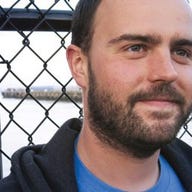
Warning: This post is in the style of a live blog. Think volcanos. Most of what's below will just be photos, notes, quotes, and fun things that I find interesting. I want you to feel like you are here, sitting in the front row with me. Enjoy.
Big Omaha is not your normal "tech conference". Unlike Web 2.0 Expo or South by Southwest, Big Omaha is about what's next, not what's already happened. Yea, it's in the middle of the midwest, but that's what makes it great. Big Omaha co-founder Jeff Slobotski said that his conference sold out this year, at 500 attendees. He doesn't want it to be the next SxSW, he wants to keep it intimate. I suspect that next year, the demand for tickets will be through the roof.
This year, the schedule looks awesome.
9:10 a.m. (CDT) The crowd gets settled. People are fighting each other for a good seat and wi-fi signal.
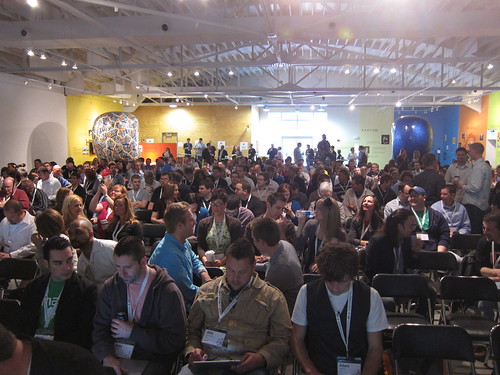 9:20 a.m. Rachelle Hruska starts things off. The Big Omaha crowd finally wakes up from a night of networking and debauchery.
9:20 a.m. Rachelle Hruska starts things off. The Big Omaha crowd finally wakes up from a night of networking and debauchery.
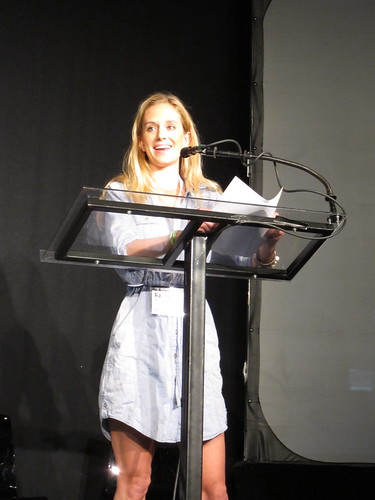 9:30 a.m. David Hauser, co-founder of Grasshopper led off Big Omaha with a cool video about entrepreneurs and innovation. Check it out:
Culture is a building block of every great company. To start with culture is really your core purpose; a reason for being. Why would someone want to work for your company if you have no culture? It's not about what you do, but how you do it.
The better you are at core values, the less time you need to spend worrying about your marketing or product development. It will just happen naturally. Authenticity is more important than selling. Stand out from the crowd, don't join it.
9:30 a.m. David Hauser, co-founder of Grasshopper led off Big Omaha with a cool video about entrepreneurs and innovation. Check it out:
Culture is a building block of every great company. To start with culture is really your core purpose; a reason for being. Why would someone want to work for your company if you have no culture? It's not about what you do, but how you do it.
The better you are at core values, the less time you need to spend worrying about your marketing or product development. It will just happen naturally. Authenticity is more important than selling. Stand out from the crowd, don't join it.
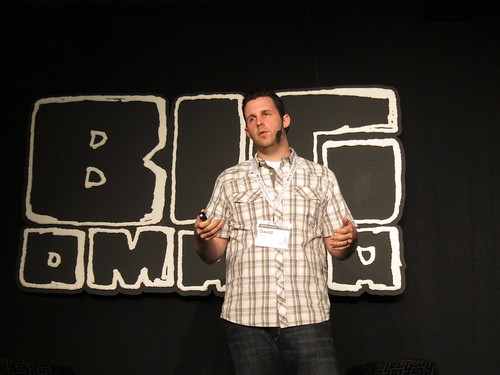 Lots of people talk about entrepreneurship, but they don't act upon it, especially our government.
Hauser is working to get 1 million signatures on a petition called "Entrepreneur's Day". He is trying to get Barack Obama to create an official holiday to recognize these innovators.
10:05 a.m. Scott Belsky, CEO of Behance, is up next. "Most ideas never happen," said Belsky.
Lots of people talk about entrepreneurship, but they don't act upon it, especially our government.
Hauser is working to get 1 million signatures on a petition called "Entrepreneur's Day". He is trying to get Barack Obama to create an official holiday to recognize these innovators.
10:05 a.m. Scott Belsky, CEO of Behance, is up next. "Most ideas never happen," said Belsky.
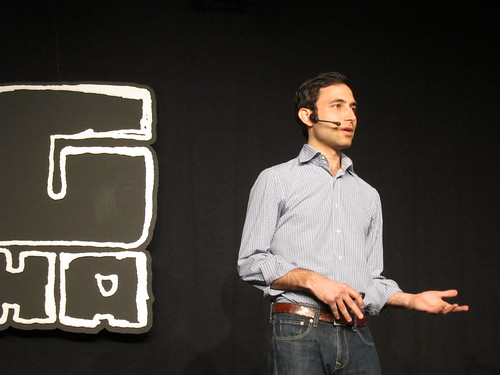 An idea happens. Excitement and energy is really high. Over the period of execution, you enter the doldrums of project management. You feel like you have been working and working and then energy starts to go down. Your impulse is to return to that high of energy and excitement, and the best way to do that is to come up with a new idea.
An idea happens. Excitement and energy is really high. Over the period of execution, you enter the doldrums of project management. You feel like you have been working and working and then energy starts to go down. Your impulse is to return to that high of energy and excitement, and the best way to do that is to come up with a new idea.
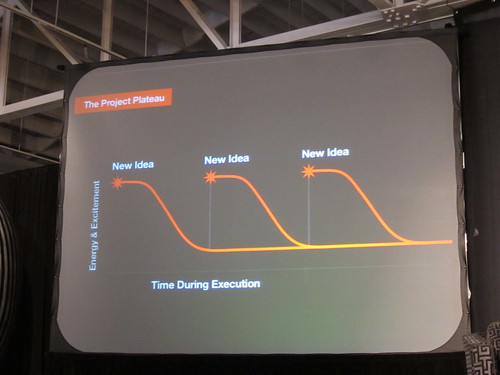 This gift of creativity is both a gift and a curse because you can start to lose track. There are more half-written novels in the world more than finished novels.
How do we survive this? When you ask people in an exit interview why they left their job, it's often because their ideas were not heard, not about money. Make sure you get your ideas out there, no matter how outrageous or impossible.
Making ideas happen = creativity/ideas + organization & execution + communal forces + leadership capability. Impact = creativity * organization.
Instead of sitting in front of your inbox and pecking through every message that comes in, be proactive. If you don't then you are living other people's to-do lists. Overcome your reactionary workflow.
This gift of creativity is both a gift and a curse because you can start to lose track. There are more half-written novels in the world more than finished novels.
How do we survive this? When you ask people in an exit interview why they left their job, it's often because their ideas were not heard, not about money. Make sure you get your ideas out there, no matter how outrageous or impossible.
Making ideas happen = creativity/ideas + organization & execution + communal forces + leadership capability. Impact = creativity * organization.
Instead of sitting in front of your inbox and pecking through every message that comes in, be proactive. If you don't then you are living other people's to-do lists. Overcome your reactionary workflow.
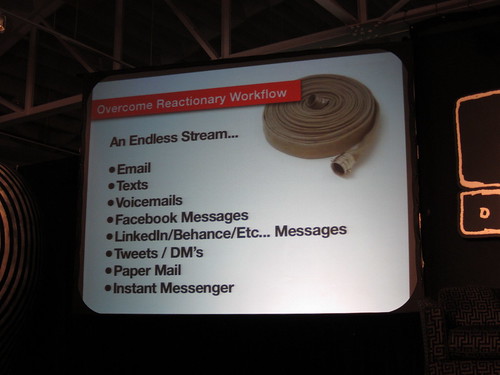 Interestingly enough, Apple is recognized as the world's best supply chain management. Ideas don't happen because they are great, but they happen because of other forces due to execution.
If you leave a meeting with nothing actionable, you should consider why you even had that meeting. Measure your meetings with action steps.
Interestingly enough, Apple is recognized as the world's best supply chain management. Ideas don't happen because they are great, but they happen because of other forces due to execution.
If you leave a meeting with nothing actionable, you should consider why you even had that meeting. Measure your meetings with action steps.
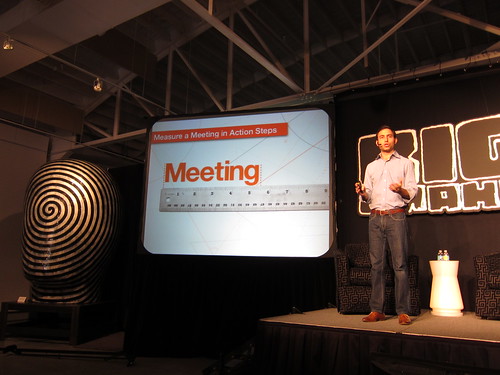 It's meeting time. Calendar tells you to leave your desk and go to a conference room. Productivity comes to a grinding halt. If you are leading the meeting, you need to spend some time figuring out what to say. Think about action.
Some businesses now are taking the chairs out of the conference rooms so that people's knees start to hurt. After 15 minutes, everyone wants to go back to their desk and sit down, and the meeting ends up being more productive that it would have if everyone was sitting.
There are three types of business people. The dreamers are always like, "oh, we can do this, we can do that". The doers are the Debby Downers of the world. "Here's why we can't do this." Then you have the incrementalists. They can switch between the dreamer and the doer mode. They have another problem: they make too many things happen, and they don't scale.
Leadership capability is a key piece of the puzzle. Leaders talk last.
It's meeting time. Calendar tells you to leave your desk and go to a conference room. Productivity comes to a grinding halt. If you are leading the meeting, you need to spend some time figuring out what to say. Think about action.
Some businesses now are taking the chairs out of the conference rooms so that people's knees start to hurt. After 15 minutes, everyone wants to go back to their desk and sit down, and the meeting ends up being more productive that it would have if everyone was sitting.
There are three types of business people. The dreamers are always like, "oh, we can do this, we can do that". The doers are the Debby Downers of the world. "Here's why we can't do this." Then you have the incrementalists. They can switch between the dreamer and the doer mode. They have another problem: they make too many things happen, and they don't scale.
Leadership capability is a key piece of the puzzle. Leaders talk last.
 Don't fill your day with "insecurity work". If you are a leadership role, don't spend all day reading Twitter or looking at Google Analytics. Let other people look at it and inform you if something goes wrong.
Value chemistry over people. You would rather work with a lesser-skilled team who gets along really well rather than a team of all-stars who hate each other.
10:40 a.m. Time for a break. I am recharging my battery so that I can keep blogging.
10:59 a.m. Rachelle Hruska gets ready for her presentation. Nerves!
Don't fill your day with "insecurity work". If you are a leadership role, don't spend all day reading Twitter or looking at Google Analytics. Let other people look at it and inform you if something goes wrong.
Value chemistry over people. You would rather work with a lesser-skilled team who gets along really well rather than a team of all-stars who hate each other.
10:40 a.m. Time for a break. I am recharging my battery so that I can keep blogging.
10:59 a.m. Rachelle Hruska gets ready for her presentation. Nerves!
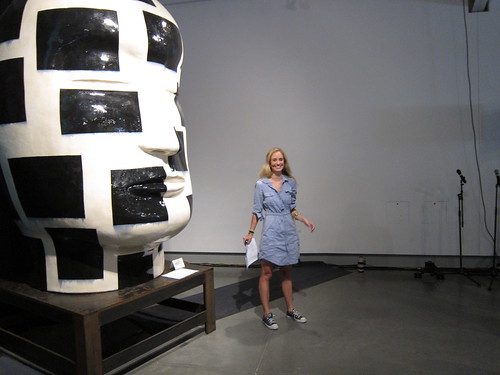 11:04 a.m. Hruska takes the stage to explain her startup Guest of a Guest, a blog with over 4 million page views a month and 20,000 email subscribers.
11:04 a.m. Hruska takes the stage to explain her startup Guest of a Guest, a blog with over 4 million page views a month and 20,000 email subscribers.
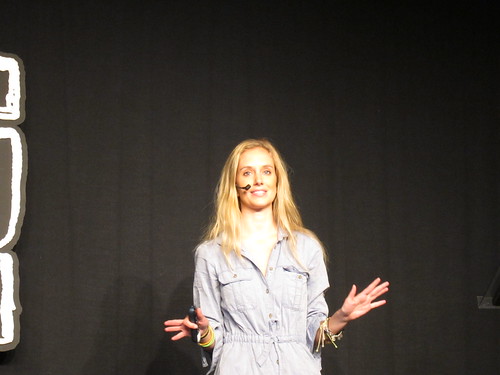 Speaking of guests, Stanely, probably one of the best bulldogs around, made an appearance:
Speaking of guests, Stanely, probably one of the best bulldogs around, made an appearance:
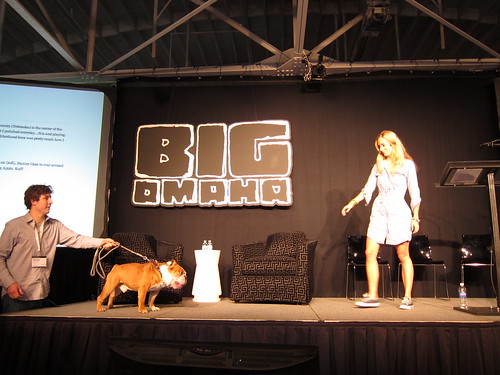 "The rollercoaster of emotions of being an entrepreneur is crazy. It's everything all at once, all the time. I would never want to live my life any other way," said Hruska.
11:15 a.m. Scott Harrison, founder of Charity Water, takes the stage.
"The rollercoaster of emotions of being an entrepreneur is crazy. It's everything all at once, all the time. I would never want to live my life any other way," said Hruska.
11:15 a.m. Scott Harrison, founder of Charity Water, takes the stage.
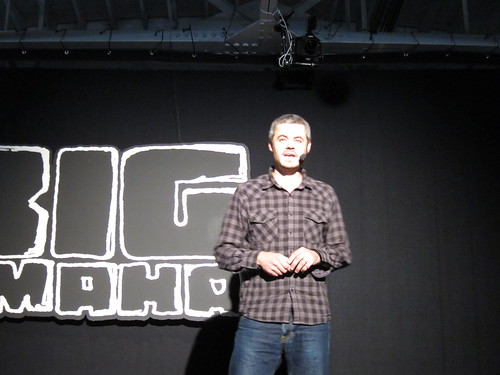 If you haven't heard of charitywater.org, then you need to now.
Harrison spoke about how he spent two years in Liberia helping people with tumors and burns. He would raise money to pay for their surgeries.
If you haven't heard of charitywater.org, then you need to now.
Harrison spoke about how he spent two years in Liberia helping people with tumors and burns. He would raise money to pay for their surgeries.
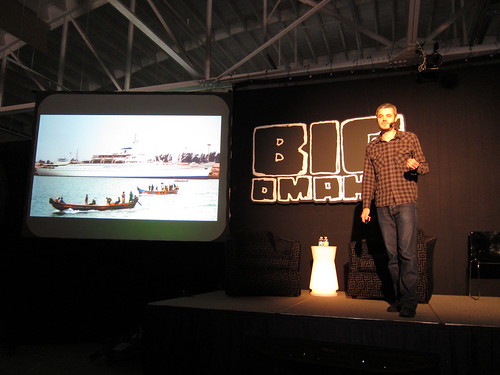 During that time, he learned how dirty and nasty the water was there. The reason everyone was sick was because of the water.
Harrison realized that fixing the dirty water problem would also fix the disease problem.
When he went back to New York, someone bought him a $16 margarita. This was his a-ha moment. How much rice could $16 buy?
During that time, he learned how dirty and nasty the water was there. The reason everyone was sick was because of the water.
Harrison realized that fixing the dirty water problem would also fix the disease problem.
When he went back to New York, someone bought him a $16 margarita. This was his a-ha moment. How much rice could $16 buy?
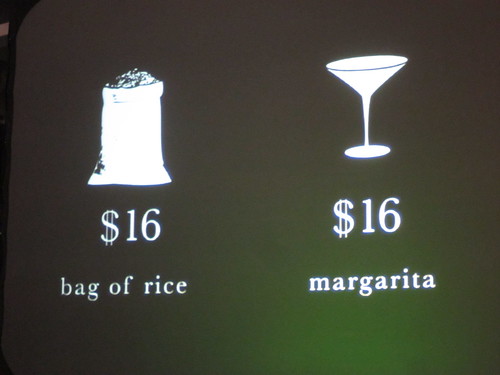 "I want to spend the rest of my life helping people," proclaimed Harrison.
There are a billion people in the world that don't have clean drinking water. 1/6th of the world's population.
"I want to spend the rest of my life helping people," proclaimed Harrison.
There are a billion people in the world that don't have clean drinking water. 1/6th of the world's population.
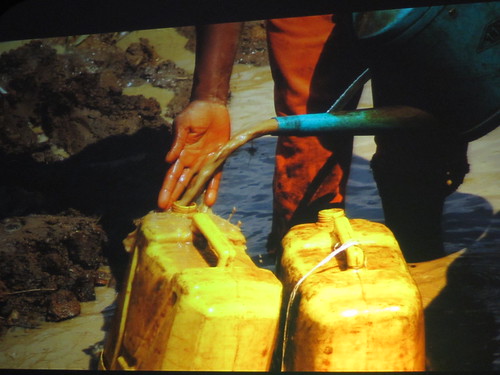 In the US, we use so much water every day. We use 150 gallons per person, per day. A billion people don't even have 1/30th of that. This is an 8-hour line for clean water:
In the US, we use so much water every day. We use 150 gallons per person, per day. A billion people don't even have 1/30th of that. This is an 8-hour line for clean water:
 88% of disease on this planet is a direct result of bad water. It's alive, even:
88% of disease on this planet is a direct result of bad water. It's alive, even:
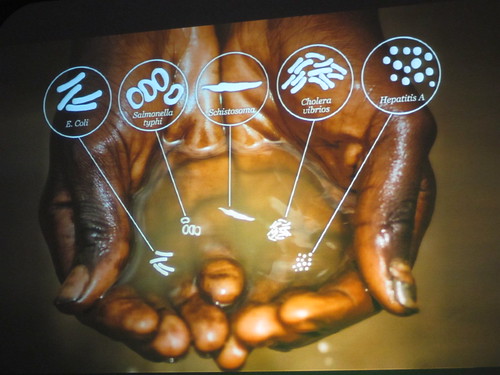 This is how they filter the dirty water:
This is how they filter the dirty water:
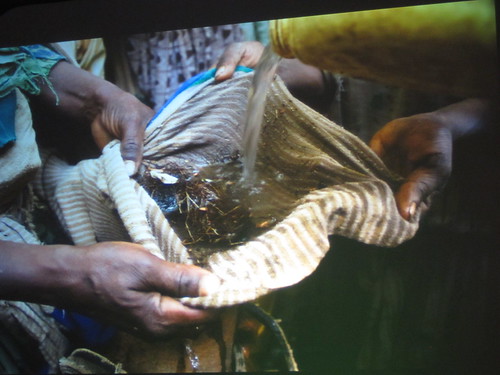 40 billion hours wasted collecting water. That's more than the entire workforce than the country of France.
Charity Water is trying to fix this problem, and it's successful so far. Tons of companies and people are helping to support Charity Water. People are even walking across the country to raise money for water.
So far over 19 million dollars have been raised. Over 1 million people have donated or helped. I think they might reach their goal of helping a billion people get clean water.
12:00 p.m. Lunch time. I will be back in 90 minutes, please let me know if you are enjoying this in the comments below.
1:37 p.m. Robert Scoble interviews Matt Mullenweg, creator of Wordpress.
40 billion hours wasted collecting water. That's more than the entire workforce than the country of France.
Charity Water is trying to fix this problem, and it's successful so far. Tons of companies and people are helping to support Charity Water. People are even walking across the country to raise money for water.
So far over 19 million dollars have been raised. Over 1 million people have donated or helped. I think they might reach their goal of helping a billion people get clean water.
12:00 p.m. Lunch time. I will be back in 90 minutes, please let me know if you are enjoying this in the comments below.
1:37 p.m. Robert Scoble interviews Matt Mullenweg, creator of Wordpress.
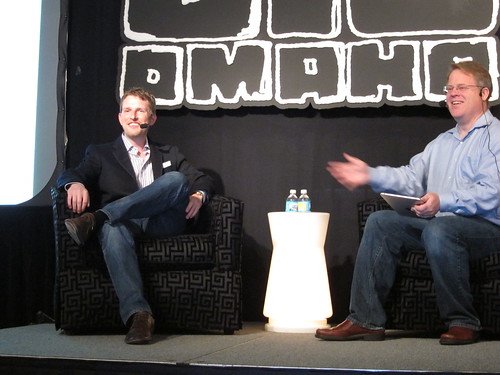 Mullenweg mostly spoke about Wordpress, angel investing, blogging, spam, geolocation, and the general state of the web.
2:04 p.m. Gary Vaynerchuk takes the stage for the keynote. Last year at Big Omaha was probably one of his best talks ever.
As Web Life tradition goes, I usually just take the best quotes from Gary and post them here (SxSW 2010, FOWA 2010, SxSW 2009).
Mullenweg mostly spoke about Wordpress, angel investing, blogging, spam, geolocation, and the general state of the web.
2:04 p.m. Gary Vaynerchuk takes the stage for the keynote. Last year at Big Omaha was probably one of his best talks ever.
As Web Life tradition goes, I usually just take the best quotes from Gary and post them here (SxSW 2010, FOWA 2010, SxSW 2009).
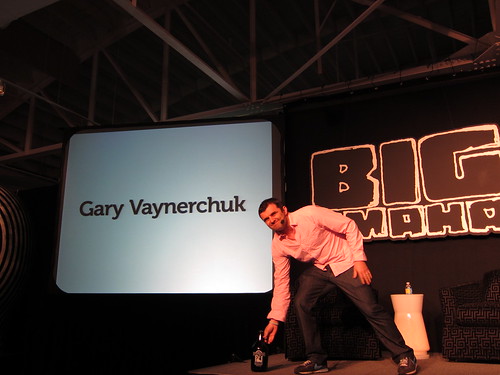
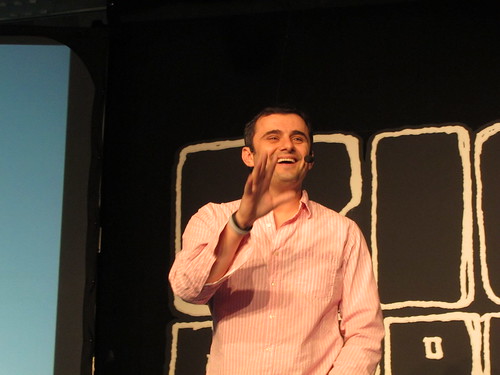 Gary is right. Companies today are doing the "one-to-many" thing. We need to get to the point where companies are doing one-on-one customer service. It's really important.
3:25 p.m. Danae Ringelmann took the stage to talk about her startup Indie GoGo.
Her company uses a collaborative online tool to raise money for making ideas come to life. She learned a lot about business just by doing, not by reading manuals.
3:49 p.m. Jason Fried from 37 Signals
Gary is right. Companies today are doing the "one-to-many" thing. We need to get to the point where companies are doing one-on-one customer service. It's really important.
3:25 p.m. Danae Ringelmann took the stage to talk about her startup Indie GoGo.
Her company uses a collaborative online tool to raise money for making ideas come to life. She learned a lot about business just by doing, not by reading manuals.
3:49 p.m. Jason Fried from 37 Signals
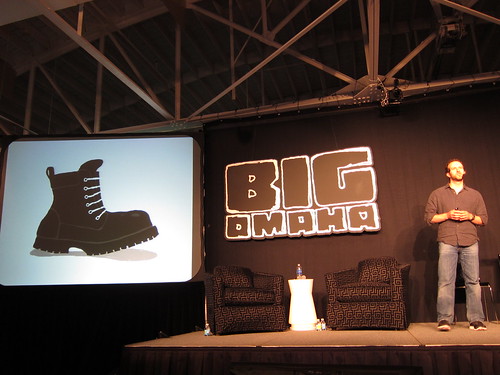 Bootstrapping. There is a big difference between a bootstrapped and a funded company. On Day 1, a bootstrapped company has to make money. A funded company has to spend money. There are some people out there that are damn good at making money. If you are used to spending it, you are not gonna be so good at making it. Venture backed companies are really good at spending, but they never learn how to make it. People say that you can't buy time? You can; by owning your own schedule.
Price. In the tech world, everyone is in to giving things away for free. It only really works for a tiny percentage of companies. Charge for something and you will get really honest feedback about it.
Usefulness > Innovation. Do something that no one has ever done. But if you aren't building anything useful, that innovation is going nowhere. Cool wears off; useful never does. I am not sure that people are going to be posting on Facebook walls 10 years from now, but they sure as hell will be using Post-It notes.
Focus on what won't change. If you invest in the things that won't change in the next 10 years, you will always win.
DIY. Try to do something internally before you try to hire someone else to do it. If you "learn" your way out of a problem, you will figure out the deep understanding of that problem and solution better than if you get someone else to do it for you.
Bootstrapping. There is a big difference between a bootstrapped and a funded company. On Day 1, a bootstrapped company has to make money. A funded company has to spend money. There are some people out there that are damn good at making money. If you are used to spending it, you are not gonna be so good at making it. Venture backed companies are really good at spending, but they never learn how to make it. People say that you can't buy time? You can; by owning your own schedule.
Price. In the tech world, everyone is in to giving things away for free. It only really works for a tiny percentage of companies. Charge for something and you will get really honest feedback about it.
Usefulness > Innovation. Do something that no one has ever done. But if you aren't building anything useful, that innovation is going nowhere. Cool wears off; useful never does. I am not sure that people are going to be posting on Facebook walls 10 years from now, but they sure as hell will be using Post-It notes.
Focus on what won't change. If you invest in the things that won't change in the next 10 years, you will always win.
DIY. Try to do something internally before you try to hire someone else to do it. If you "learn" your way out of a problem, you will figure out the deep understanding of that problem and solution better than if you get someone else to do it for you.
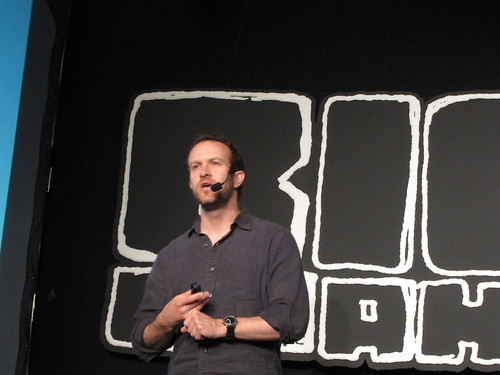 Say sorry. Companies and politicians are usually bad at apoligizing. "We apologize for any inconvenience we have caused you," is not a good apology. When you spill coffee on someone, you say "I'm so so sorry". You say what you mean. If people trust your apologies, you're doing a whole lot of stuff right.
Draw a line in the sand. There are far too few companies that know what they stand for. What does HP even stand for? To figure out what you stand for, figure out what you would say "no" to. When you draw a line in the sand, everything comes easier. When Whole Foods says that they won't accept artificial ingredients in their products, their job becomes easier.
Specs, features, technology. They might drive companies, but they don't drive the public.
7:02 p.m. The VIP dinner was hosted by Omaha Steaks. These guys are using social media to promote their products and also interact with customers.
Say sorry. Companies and politicians are usually bad at apoligizing. "We apologize for any inconvenience we have caused you," is not a good apology. When you spill coffee on someone, you say "I'm so so sorry". You say what you mean. If people trust your apologies, you're doing a whole lot of stuff right.
Draw a line in the sand. There are far too few companies that know what they stand for. What does HP even stand for? To figure out what you stand for, figure out what you would say "no" to. When you draw a line in the sand, everything comes easier. When Whole Foods says that they won't accept artificial ingredients in their products, their job becomes easier.
Specs, features, technology. They might drive companies, but they don't drive the public.
7:02 p.m. The VIP dinner was hosted by Omaha Steaks. These guys are using social media to promote their products and also interact with customers.
 Omaha has a brewery called Lucky Bucket. It was tasty.
Omaha has a brewery called Lucky Bucket. It was tasty.
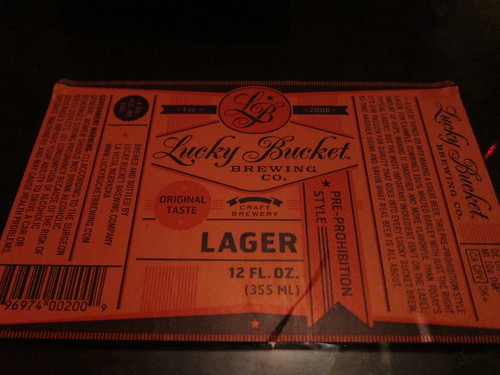 8:39 a.m. The morning crowd at Big Omaha is building. It's gonna be an exciting day of presentations.
8:39 a.m. The morning crowd at Big Omaha is building. It's gonna be an exciting day of presentations.
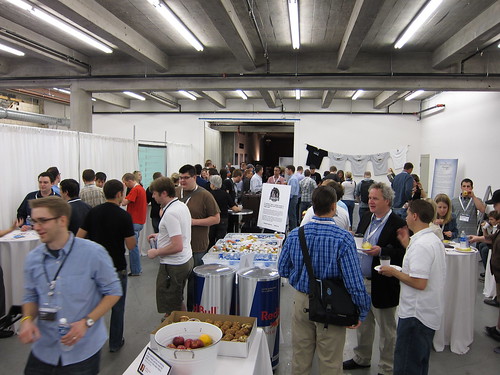 9:13 a.m. It's time to get started with Big Omaha Day 2.
9:13 a.m. It's time to get started with Big Omaha Day 2.
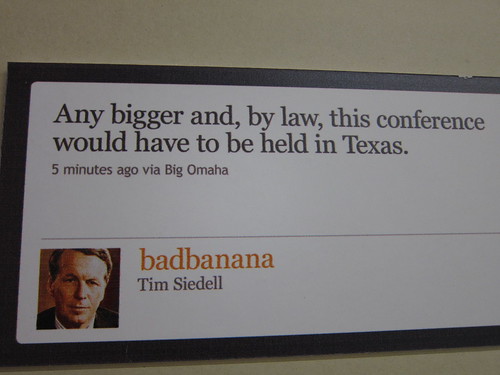 9:15 a.m. Foursquare co-founder Dennis Crowley takes the stage.
"Every checkin saves a kitten," said Crowley.
9:15 a.m. Foursquare co-founder Dennis Crowley takes the stage.
"Every checkin saves a kitten," said Crowley.
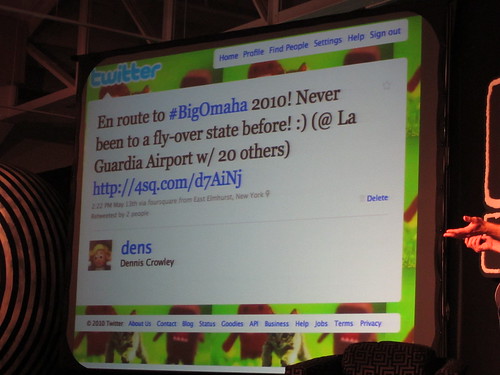 After apoligizing for calling Nebraska a "fly-over" state, Crowley explained everything he has done in his career, including Dodgeball.
After apoligizing for calling Nebraska a "fly-over" state, Crowley explained everything he has done in his career, including Dodgeball.
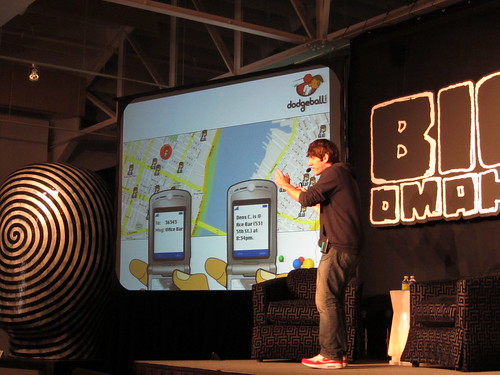 He explained that Dodgeball and Foursquare were just side projects that they created for their friends. The idea of broadcasting your location to the world was unheard of back in the early 2000s, but it's all Dennis could think about.
One of my favorite pet projects of Crowley's is Pac Manhattan.
He explained that Dodgeball and Foursquare were just side projects that they created for their friends. The idea of broadcasting your location to the world was unheard of back in the early 2000s, but it's all Dennis could think about.
One of my favorite pet projects of Crowley's is Pac Manhattan.
 After Google crushed Crowley's dreams, he wasn't sure what to do with his life. He went on a trip to Sweeden, and a bunch of people gave him recommendations about what to do there. He realized that the Dodgeball-stuff was his passion. Foursquare was born.
"I don't want to be a CEO, but I have to be a CEO to get the products that I want built," said Crowley.
Right now, there have been 40 million checkins. Foursquare has 1.2 million users.
The crazy thing is that Dennis has always said, "OMG, we will never do anything this big again," but they are only 10 pages deep in their 100 page thesis.
After Google crushed Crowley's dreams, he wasn't sure what to do with his life. He went on a trip to Sweeden, and a bunch of people gave him recommendations about what to do there. He realized that the Dodgeball-stuff was his passion. Foursquare was born.
"I don't want to be a CEO, but I have to be a CEO to get the products that I want built," said Crowley.
Right now, there have been 40 million checkins. Foursquare has 1.2 million users.
The crazy thing is that Dennis has always said, "OMG, we will never do anything this big again," but they are only 10 pages deep in their 100 page thesis.
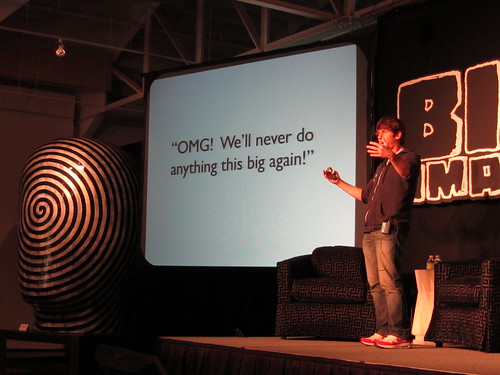 He compares locative social gaming to Zelda. You get rewards, points, and things for doing stuff you would normally do anyway.
10:01 a.m. Co-founder of StyleSeat, Melody McCloskey, took the stage next. She called San Francisco the "grad school for real life".
StyleSeat is determined to help small businesses learn more about their customers using analytics and product integration.
Melody explained the top things that she learned when starting her business. Here are some of her tips:
He compares locative social gaming to Zelda. You get rewards, points, and things for doing stuff you would normally do anyway.
10:01 a.m. Co-founder of StyleSeat, Melody McCloskey, took the stage next. She called San Francisco the "grad school for real life".
StyleSeat is determined to help small businesses learn more about their customers using analytics and product integration.
Melody explained the top things that she learned when starting her business. Here are some of her tips:
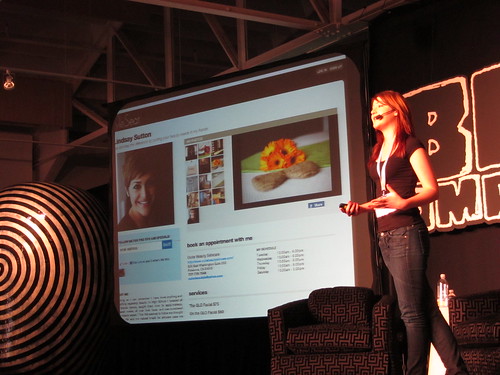 Know your motivation. Why are you starting a company? What excites you and what makes you want to make your product better?
People are everything. You are building a company and a product to help people, right? Credibility, honesty and trust will drive your company.
Let go of your fear. Once you realize that you are doing the thing you want to do, the fear washes over you.
Know your motivation. Why are you starting a company? What excites you and what makes you want to make your product better?
People are everything. You are building a company and a product to help people, right? Credibility, honesty and trust will drive your company.
Let go of your fear. Once you realize that you are doing the thing you want to do, the fear washes over you.
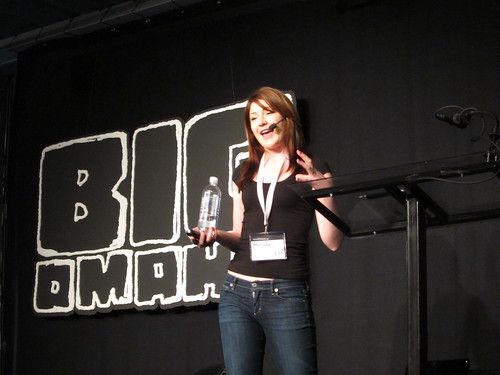 Know your worst case scenario. What if you totally fail? Yea, you will lose some money and then you will have to go work at a startup. If you create a company, our worst case scenario is most people's best case scenario. Embrace your fears.
Doing something poorly is better than doing nothing at all. Minimum viable products do not win beauty contests. "You miss 100% of the shots you don't take". And if you go down in flames, may they be glorious.
If you're not in San Francisco, Boulder, or New York, MOVE! Your city is a wonderful place. We need more tech communities, but all of the entrepreneurs, companies, VCs, writers, and analysts are in one of these three cities.
Doing what you want to do is really freaking important. Make sure the thing you're doing is the most essential thing you would be doing, because you are building your legacy.
Respect the pitch. Have that one-liner about a problem and then explain that your company is the solution. Every new person that you meet could be your next customer, referrer or evangelist.
10:34 a.m. Next up is the Entrepreneur Panel:
Know your worst case scenario. What if you totally fail? Yea, you will lose some money and then you will have to go work at a startup. If you create a company, our worst case scenario is most people's best case scenario. Embrace your fears.
Doing something poorly is better than doing nothing at all. Minimum viable products do not win beauty contests. "You miss 100% of the shots you don't take". And if you go down in flames, may they be glorious.
If you're not in San Francisco, Boulder, or New York, MOVE! Your city is a wonderful place. We need more tech communities, but all of the entrepreneurs, companies, VCs, writers, and analysts are in one of these three cities.
Doing what you want to do is really freaking important. Make sure the thing you're doing is the most essential thing you would be doing, because you are building your legacy.
Respect the pitch. Have that one-liner about a problem and then explain that your company is the solution. Every new person that you meet could be your next customer, referrer or evangelist.
10:34 a.m. Next up is the Entrepreneur Panel:
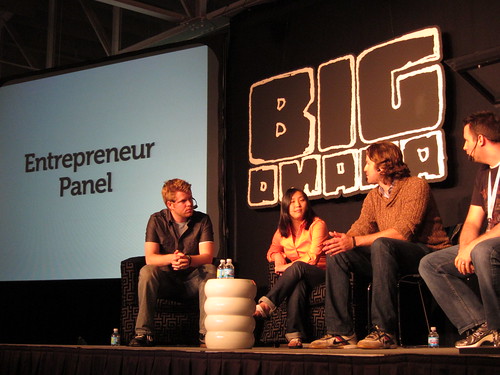 You gotta go where the money is. Like Melody said, you need to visit one of these big cities with VCs. These communities are thriving; there are tech events every night.
How do you build a product that distributes it just by using it? Foursquare is a great example: people see checkins on Twitter and they are exposed to it. At first, they hate it, then they get more interested in it and have to click the tiny 4sq.com URL and see what everyone is talking about.
Network effects and viral coefficients are redefining the startup world.
If your product is not sexy, you can still use the "typical consumer Internet" to build that brand's importance so that people know who you are, even though they will never interact with you.
You gotta go where the money is. Like Melody said, you need to visit one of these big cities with VCs. These communities are thriving; there are tech events every night.
How do you build a product that distributes it just by using it? Foursquare is a great example: people see checkins on Twitter and they are exposed to it. At first, they hate it, then they get more interested in it and have to click the tiny 4sq.com URL and see what everyone is talking about.
Network effects and viral coefficients are redefining the startup world.
If your product is not sexy, you can still use the "typical consumer Internet" to build that brand's importance so that people know who you are, even though they will never interact with you.
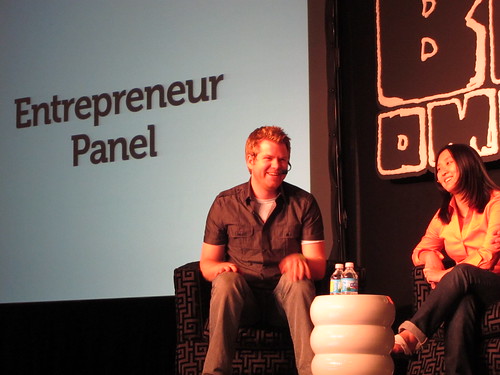 Game mechanics really matter. Weight Watchers is the most successful weight loss program because it's a game. Your only goal is to make sure that you stay positive on your points. You have something to quantify against it.
11:05 a.m. My time at Big Omaha has come to an end. I learned a lot and had so much fun. I really think this is not your normal conference. Multi-track conferences like SxSW and Wordcamp are great, but they lose a little bit of focus. At Big Omaha, everything is focused. The speakers are all top-notch. Not one of the speakers bored me or irritated me. I was inspired, and captivated.
Please leave me some feedback in the comments. Did you enjoy this, or was it awful? Thanks for taking time to read this. It's my goal to try and capture everything at these conferences because I know that a lot of you can't be here.
Big props to Silicon Prairie News for putting this all together. You better believe that I will be here next year.
Game mechanics really matter. Weight Watchers is the most successful weight loss program because it's a game. Your only goal is to make sure that you stay positive on your points. You have something to quantify against it.
11:05 a.m. My time at Big Omaha has come to an end. I learned a lot and had so much fun. I really think this is not your normal conference. Multi-track conferences like SxSW and Wordcamp are great, but they lose a little bit of focus. At Big Omaha, everything is focused. The speakers are all top-notch. Not one of the speakers bored me or irritated me. I was inspired, and captivated.
Please leave me some feedback in the comments. Did you enjoy this, or was it awful? Thanks for taking time to read this. It's my goal to try and capture everything at these conferences because I know that a lot of you can't be here.
Big props to Silicon Prairie News for putting this all together. You better believe that I will be here next year.
 9:20 a.m. Rachelle Hruska starts things off. The Big Omaha crowd finally wakes up from a night of networking and debauchery.
9:20 a.m. Rachelle Hruska starts things off. The Big Omaha crowd finally wakes up from a night of networking and debauchery.
 9:30 a.m. David Hauser, co-founder of Grasshopper led off Big Omaha with a cool video about entrepreneurs and innovation. Check it out:
Culture is a building block of every great company. To start with culture is really your core purpose; a reason for being. Why would someone want to work for your company if you have no culture? It's not about what you do, but how you do it.
9:30 a.m. David Hauser, co-founder of Grasshopper led off Big Omaha with a cool video about entrepreneurs and innovation. Check it out:
Culture is a building block of every great company. To start with culture is really your core purpose; a reason for being. Why would someone want to work for your company if you have no culture? It's not about what you do, but how you do it.
“Honesty” “Respect” “Excellence” These are bullsh*t. These are a waste of time. Those are the rules to play the game. - @dh #BigOmaha
 Lots of people talk about entrepreneurship, but they don't act upon it, especially our government.
Hauser is working to get 1 million signatures on a petition called "Entrepreneur's Day". He is trying to get Barack Obama to create an official holiday to recognize these innovators.
10:05 a.m. Scott Belsky, CEO of Behance, is up next. "Most ideas never happen," said Belsky.
Lots of people talk about entrepreneurship, but they don't act upon it, especially our government.
Hauser is working to get 1 million signatures on a petition called "Entrepreneur's Day". He is trying to get Barack Obama to create an official holiday to recognize these innovators.
10:05 a.m. Scott Belsky, CEO of Behance, is up next. "Most ideas never happen," said Belsky.
 An idea happens. Excitement and energy is really high. Over the period of execution, you enter the doldrums of project management. You feel like you have been working and working and then energy starts to go down. Your impulse is to return to that high of energy and excitement, and the best way to do that is to come up with a new idea.
An idea happens. Excitement and energy is really high. Over the period of execution, you enter the doldrums of project management. You feel like you have been working and working and then energy starts to go down. Your impulse is to return to that high of energy and excitement, and the best way to do that is to come up with a new idea.
 This gift of creativity is both a gift and a curse because you can start to lose track. There are more half-written novels in the world more than finished novels.
How do we survive this? When you ask people in an exit interview why they left their job, it's often because their ideas were not heard, not about money. Make sure you get your ideas out there, no matter how outrageous or impossible.
Making ideas happen = creativity/ideas + organization & execution + communal forces + leadership capability. Impact = creativity * organization.
Instead of sitting in front of your inbox and pecking through every message that comes in, be proactive. If you don't then you are living other people's to-do lists. Overcome your reactionary workflow.
This gift of creativity is both a gift and a curse because you can start to lose track. There are more half-written novels in the world more than finished novels.
How do we survive this? When you ask people in an exit interview why they left their job, it's often because their ideas were not heard, not about money. Make sure you get your ideas out there, no matter how outrageous or impossible.
Making ideas happen = creativity/ideas + organization & execution + communal forces + leadership capability. Impact = creativity * organization.
Instead of sitting in front of your inbox and pecking through every message that comes in, be proactive. If you don't then you are living other people's to-do lists. Overcome your reactionary workflow.
 Interestingly enough, Apple is recognized as the world's best supply chain management. Ideas don't happen because they are great, but they happen because of other forces due to execution.
If you leave a meeting with nothing actionable, you should consider why you even had that meeting. Measure your meetings with action steps.
Interestingly enough, Apple is recognized as the world's best supply chain management. Ideas don't happen because they are great, but they happen because of other forces due to execution.
If you leave a meeting with nothing actionable, you should consider why you even had that meeting. Measure your meetings with action steps.
 It's meeting time. Calendar tells you to leave your desk and go to a conference room. Productivity comes to a grinding halt. If you are leading the meeting, you need to spend some time figuring out what to say. Think about action.
Some businesses now are taking the chairs out of the conference rooms so that people's knees start to hurt. After 15 minutes, everyone wants to go back to their desk and sit down, and the meeting ends up being more productive that it would have if everyone was sitting.
There are three types of business people. The dreamers are always like, "oh, we can do this, we can do that". The doers are the Debby Downers of the world. "Here's why we can't do this." Then you have the incrementalists. They can switch between the dreamer and the doer mode. They have another problem: they make too many things happen, and they don't scale.
It's meeting time. Calendar tells you to leave your desk and go to a conference room. Productivity comes to a grinding halt. If you are leading the meeting, you need to spend some time figuring out what to say. Think about action.
Some businesses now are taking the chairs out of the conference rooms so that people's knees start to hurt. After 15 minutes, everyone wants to go back to their desk and sit down, and the meeting ends up being more productive that it would have if everyone was sitting.
There are three types of business people. The dreamers are always like, "oh, we can do this, we can do that". The doers are the Debby Downers of the world. "Here's why we can't do this." Then you have the incrementalists. They can switch between the dreamer and the doer mode. They have another problem: they make too many things happen, and they don't scale.
@scottbelsky Believes we should share ideas liberally. If others have a strong reaction, it's an idea worth pursuing #bigomaha
 Don't fill your day with "insecurity work". If you are a leadership role, don't spend all day reading Twitter or looking at Google Analytics. Let other people look at it and inform you if something goes wrong.
Value chemistry over people. You would rather work with a lesser-skilled team who gets along really well rather than a team of all-stars who hate each other.
10:40 a.m. Time for a break. I am recharging my battery so that I can keep blogging.
10:59 a.m. Rachelle Hruska gets ready for her presentation. Nerves!
Don't fill your day with "insecurity work". If you are a leadership role, don't spend all day reading Twitter or looking at Google Analytics. Let other people look at it and inform you if something goes wrong.
Value chemistry over people. You would rather work with a lesser-skilled team who gets along really well rather than a team of all-stars who hate each other.
10:40 a.m. Time for a break. I am recharging my battery so that I can keep blogging.
10:59 a.m. Rachelle Hruska gets ready for her presentation. Nerves!
 11:04 a.m. Hruska takes the stage to explain her startup Guest of a Guest, a blog with over 4 million page views a month and 20,000 email subscribers.
11:04 a.m. Hruska takes the stage to explain her startup Guest of a Guest, a blog with over 4 million page views a month and 20,000 email subscribers.
 Speaking of guests, Stanely, probably one of the best bulldogs around, made an appearance:
Speaking of guests, Stanely, probably one of the best bulldogs around, made an appearance:
 "The rollercoaster of emotions of being an entrepreneur is crazy. It's everything all at once, all the time. I would never want to live my life any other way," said Hruska.
11:15 a.m. Scott Harrison, founder of Charity Water, takes the stage.
"The rollercoaster of emotions of being an entrepreneur is crazy. It's everything all at once, all the time. I would never want to live my life any other way," said Hruska.
11:15 a.m. Scott Harrison, founder of Charity Water, takes the stage.
 If you haven't heard of charitywater.org, then you need to now.
Harrison spoke about how he spent two years in Liberia helping people with tumors and burns. He would raise money to pay for their surgeries.
If you haven't heard of charitywater.org, then you need to now.
Harrison spoke about how he spent two years in Liberia helping people with tumors and burns. He would raise money to pay for their surgeries.
 During that time, he learned how dirty and nasty the water was there. The reason everyone was sick was because of the water.
Harrison realized that fixing the dirty water problem would also fix the disease problem.
When he went back to New York, someone bought him a $16 margarita. This was his a-ha moment. How much rice could $16 buy?
During that time, he learned how dirty and nasty the water was there. The reason everyone was sick was because of the water.
Harrison realized that fixing the dirty water problem would also fix the disease problem.
When he went back to New York, someone bought him a $16 margarita. This was his a-ha moment. How much rice could $16 buy?
 "I want to spend the rest of my life helping people," proclaimed Harrison.
There are a billion people in the world that don't have clean drinking water. 1/6th of the world's population.
"I want to spend the rest of my life helping people," proclaimed Harrison.
There are a billion people in the world that don't have clean drinking water. 1/6th of the world's population.
 In the US, we use so much water every day. We use 150 gallons per person, per day. A billion people don't even have 1/30th of that. This is an 8-hour line for clean water:
In the US, we use so much water every day. We use 150 gallons per person, per day. A billion people don't even have 1/30th of that. This is an 8-hour line for clean water:
 88% of disease on this planet is a direct result of bad water. It's alive, even:
88% of disease on this planet is a direct result of bad water. It's alive, even:
 This is how they filter the dirty water:
This is how they filter the dirty water:
 40 billion hours wasted collecting water. That's more than the entire workforce than the country of France.
Charity Water is trying to fix this problem, and it's successful so far. Tons of companies and people are helping to support Charity Water. People are even walking across the country to raise money for water.
So far over 19 million dollars have been raised. Over 1 million people have donated or helped. I think they might reach their goal of helping a billion people get clean water.
12:00 p.m. Lunch time. I will be back in 90 minutes, please let me know if you are enjoying this in the comments below.
1:37 p.m. Robert Scoble interviews Matt Mullenweg, creator of Wordpress.
40 billion hours wasted collecting water. That's more than the entire workforce than the country of France.
Charity Water is trying to fix this problem, and it's successful so far. Tons of companies and people are helping to support Charity Water. People are even walking across the country to raise money for water.
So far over 19 million dollars have been raised. Over 1 million people have donated or helped. I think they might reach their goal of helping a billion people get clean water.
12:00 p.m. Lunch time. I will be back in 90 minutes, please let me know if you are enjoying this in the comments below.
1:37 p.m. Robert Scoble interviews Matt Mullenweg, creator of Wordpress.
Matt Mullenweg: toolbars on blogs are like Mullet websites #bigomaha
 Mullenweg mostly spoke about Wordpress, angel investing, blogging, spam, geolocation, and the general state of the web.
2:04 p.m. Gary Vaynerchuk takes the stage for the keynote. Last year at Big Omaha was probably one of his best talks ever.
As Web Life tradition goes, I usually just take the best quotes from Gary and post them here (SxSW 2010, FOWA 2010, SxSW 2009).
Mullenweg mostly spoke about Wordpress, angel investing, blogging, spam, geolocation, and the general state of the web.
2:04 p.m. Gary Vaynerchuk takes the stage for the keynote. Last year at Big Omaha was probably one of his best talks ever.
As Web Life tradition goes, I usually just take the best quotes from Gary and post them here (SxSW 2010, FOWA 2010, SxSW 2009).

I rebranded my family's buisness from "Shopper's Discount Liquors" to Wine Library. I'm completely obsessed with the fact that we can do whatever we want from 6pm - 8am every night. The consumer internet is like 16 years. It's only been since 1994 since AOL started spamming our mailboxes. It's just a kid. How many of you said that you would not get a Facebook account? How many of you now have Facebook accounts? Everything is built on where people draw lines in the sand, and then cross those lines. I have this huge dream of drinking wine with Matt Mullenweg and Chad Ocho Cinqo. I think you can scale one on one relationships. People need to stop bullsh*tting themselves. I think people are scared about their passion. I just need to get dirty. Like Christina Aguilera-style. This is the biggest shift in our society. EVER. I do not think most people have wrapped their head around how enormous this is. We are only at the beginning. When I own the NY Jets, I am going to mail every kid in the US a Jets jersey on their 7th birthday.
 Gary is right. Companies today are doing the "one-to-many" thing. We need to get to the point where companies are doing one-on-one customer service. It's really important.
3:25 p.m. Danae Ringelmann took the stage to talk about her startup Indie GoGo.
Her company uses a collaborative online tool to raise money for making ideas come to life. She learned a lot about business just by doing, not by reading manuals.
3:49 p.m. Jason Fried from 37 Signals
Gary is right. Companies today are doing the "one-to-many" thing. We need to get to the point where companies are doing one-on-one customer service. It's really important.
3:25 p.m. Danae Ringelmann took the stage to talk about her startup Indie GoGo.
Her company uses a collaborative online tool to raise money for making ideas come to life. She learned a lot about business just by doing, not by reading manuals.
3:49 p.m. Jason Fried from 37 Signals
 Bootstrapping. There is a big difference between a bootstrapped and a funded company. On Day 1, a bootstrapped company has to make money. A funded company has to spend money. There are some people out there that are damn good at making money. If you are used to spending it, you are not gonna be so good at making it. Venture backed companies are really good at spending, but they never learn how to make it. People say that you can't buy time? You can; by owning your own schedule.
Price. In the tech world, everyone is in to giving things away for free. It only really works for a tiny percentage of companies. Charge for something and you will get really honest feedback about it.
Usefulness > Innovation. Do something that no one has ever done. But if you aren't building anything useful, that innovation is going nowhere. Cool wears off; useful never does. I am not sure that people are going to be posting on Facebook walls 10 years from now, but they sure as hell will be using Post-It notes.
Focus on what won't change. If you invest in the things that won't change in the next 10 years, you will always win.
DIY. Try to do something internally before you try to hire someone else to do it. If you "learn" your way out of a problem, you will figure out the deep understanding of that problem and solution better than if you get someone else to do it for you.
Bootstrapping. There is a big difference between a bootstrapped and a funded company. On Day 1, a bootstrapped company has to make money. A funded company has to spend money. There are some people out there that are damn good at making money. If you are used to spending it, you are not gonna be so good at making it. Venture backed companies are really good at spending, but they never learn how to make it. People say that you can't buy time? You can; by owning your own schedule.
Price. In the tech world, everyone is in to giving things away for free. It only really works for a tiny percentage of companies. Charge for something and you will get really honest feedback about it.
Usefulness > Innovation. Do something that no one has ever done. But if you aren't building anything useful, that innovation is going nowhere. Cool wears off; useful never does. I am not sure that people are going to be posting on Facebook walls 10 years from now, but they sure as hell will be using Post-It notes.
Focus on what won't change. If you invest in the things that won't change in the next 10 years, you will always win.
DIY. Try to do something internally before you try to hire someone else to do it. If you "learn" your way out of a problem, you will figure out the deep understanding of that problem and solution better than if you get someone else to do it for you.
 Say sorry. Companies and politicians are usually bad at apoligizing. "We apologize for any inconvenience we have caused you," is not a good apology. When you spill coffee on someone, you say "I'm so so sorry". You say what you mean. If people trust your apologies, you're doing a whole lot of stuff right.
Draw a line in the sand. There are far too few companies that know what they stand for. What does HP even stand for? To figure out what you stand for, figure out what you would say "no" to. When you draw a line in the sand, everything comes easier. When Whole Foods says that they won't accept artificial ingredients in their products, their job becomes easier.
Specs, features, technology. They might drive companies, but they don't drive the public.
7:02 p.m. The VIP dinner was hosted by Omaha Steaks. These guys are using social media to promote their products and also interact with customers.
Say sorry. Companies and politicians are usually bad at apoligizing. "We apologize for any inconvenience we have caused you," is not a good apology. When you spill coffee on someone, you say "I'm so so sorry". You say what you mean. If people trust your apologies, you're doing a whole lot of stuff right.
Draw a line in the sand. There are far too few companies that know what they stand for. What does HP even stand for? To figure out what you stand for, figure out what you would say "no" to. When you draw a line in the sand, everything comes easier. When Whole Foods says that they won't accept artificial ingredients in their products, their job becomes easier.
Specs, features, technology. They might drive companies, but they don't drive the public.
7:02 p.m. The VIP dinner was hosted by Omaha Steaks. These guys are using social media to promote their products and also interact with customers.
 Omaha has a brewery called Lucky Bucket. It was tasty.
Omaha has a brewery called Lucky Bucket. It was tasty.

Saturday
1:09 a.m. The morning's first speaker starts the day off across the river in Iowa:Note to my future self: "Told you not to jump in that van to Iowa!"
 9:13 a.m. It's time to get started with Big Omaha Day 2.
9:13 a.m. It's time to get started with Big Omaha Day 2.
 9:15 a.m. Foursquare co-founder Dennis Crowley takes the stage.
"Every checkin saves a kitten," said Crowley.
9:15 a.m. Foursquare co-founder Dennis Crowley takes the stage.
"Every checkin saves a kitten," said Crowley.
 After apoligizing for calling Nebraska a "fly-over" state, Crowley explained everything he has done in his career, including Dodgeball.
After apoligizing for calling Nebraska a "fly-over" state, Crowley explained everything he has done in his career, including Dodgeball.
 He explained that Dodgeball and Foursquare were just side projects that they created for their friends. The idea of broadcasting your location to the world was unheard of back in the early 2000s, but it's all Dennis could think about.
One of my favorite pet projects of Crowley's is Pac Manhattan.
He explained that Dodgeball and Foursquare were just side projects that they created for their friends. The idea of broadcasting your location to the world was unheard of back in the early 2000s, but it's all Dennis could think about.
One of my favorite pet projects of Crowley's is Pac Manhattan.
 After Google crushed Crowley's dreams, he wasn't sure what to do with his life. He went on a trip to Sweeden, and a bunch of people gave him recommendations about what to do there. He realized that the Dodgeball-stuff was his passion. Foursquare was born.
"I don't want to be a CEO, but I have to be a CEO to get the products that I want built," said Crowley.
Right now, there have been 40 million checkins. Foursquare has 1.2 million users.
The crazy thing is that Dennis has always said, "OMG, we will never do anything this big again," but they are only 10 pages deep in their 100 page thesis.
After Google crushed Crowley's dreams, he wasn't sure what to do with his life. He went on a trip to Sweeden, and a bunch of people gave him recommendations about what to do there. He realized that the Dodgeball-stuff was his passion. Foursquare was born.
"I don't want to be a CEO, but I have to be a CEO to get the products that I want built," said Crowley.
Right now, there have been 40 million checkins. Foursquare has 1.2 million users.
The crazy thing is that Dennis has always said, "OMG, we will never do anything this big again," but they are only 10 pages deep in their 100 page thesis.
 He compares locative social gaming to Zelda. You get rewards, points, and things for doing stuff you would normally do anyway.
10:01 a.m. Co-founder of StyleSeat, Melody McCloskey, took the stage next. She called San Francisco the "grad school for real life".
StyleSeat is determined to help small businesses learn more about their customers using analytics and product integration.
Melody explained the top things that she learned when starting her business. Here are some of her tips:
He compares locative social gaming to Zelda. You get rewards, points, and things for doing stuff you would normally do anyway.
10:01 a.m. Co-founder of StyleSeat, Melody McCloskey, took the stage next. She called San Francisco the "grad school for real life".
StyleSeat is determined to help small businesses learn more about their customers using analytics and product integration.
Melody explained the top things that she learned when starting her business. Here are some of her tips:
 Know your motivation. Why are you starting a company? What excites you and what makes you want to make your product better?
People are everything. You are building a company and a product to help people, right? Credibility, honesty and trust will drive your company.
Let go of your fear. Once you realize that you are doing the thing you want to do, the fear washes over you.
Know your motivation. Why are you starting a company? What excites you and what makes you want to make your product better?
People are everything. You are building a company and a product to help people, right? Credibility, honesty and trust will drive your company.
Let go of your fear. Once you realize that you are doing the thing you want to do, the fear washes over you.
 Know your worst case scenario. What if you totally fail? Yea, you will lose some money and then you will have to go work at a startup. If you create a company, our worst case scenario is most people's best case scenario. Embrace your fears.
Doing something poorly is better than doing nothing at all. Minimum viable products do not win beauty contests. "You miss 100% of the shots you don't take". And if you go down in flames, may they be glorious.
If you're not in San Francisco, Boulder, or New York, MOVE! Your city is a wonderful place. We need more tech communities, but all of the entrepreneurs, companies, VCs, writers, and analysts are in one of these three cities.
Doing what you want to do is really freaking important. Make sure the thing you're doing is the most essential thing you would be doing, because you are building your legacy.
Respect the pitch. Have that one-liner about a problem and then explain that your company is the solution. Every new person that you meet could be your next customer, referrer or evangelist.
10:34 a.m. Next up is the Entrepreneur Panel:
Know your worst case scenario. What if you totally fail? Yea, you will lose some money and then you will have to go work at a startup. If you create a company, our worst case scenario is most people's best case scenario. Embrace your fears.
Doing something poorly is better than doing nothing at all. Minimum viable products do not win beauty contests. "You miss 100% of the shots you don't take". And if you go down in flames, may they be glorious.
If you're not in San Francisco, Boulder, or New York, MOVE! Your city is a wonderful place. We need more tech communities, but all of the entrepreneurs, companies, VCs, writers, and analysts are in one of these three cities.
Doing what you want to do is really freaking important. Make sure the thing you're doing is the most essential thing you would be doing, because you are building your legacy.
Respect the pitch. Have that one-liner about a problem and then explain that your company is the solution. Every new person that you meet could be your next customer, referrer or evangelist.
10:34 a.m. Next up is the Entrepreneur Panel:
- Alexa Andrzejewski - Foodspotting
- Justin Shaffer - Hot Potato
- Matt Galligan - SimpleGeo (disclosure)
 You gotta go where the money is. Like Melody said, you need to visit one of these big cities with VCs. These communities are thriving; there are tech events every night.
How do you build a product that distributes it just by using it? Foursquare is a great example: people see checkins on Twitter and they are exposed to it. At first, they hate it, then they get more interested in it and have to click the tiny 4sq.com URL and see what everyone is talking about.
Network effects and viral coefficients are redefining the startup world.
If your product is not sexy, you can still use the "typical consumer Internet" to build that brand's importance so that people know who you are, even though they will never interact with you.
You gotta go where the money is. Like Melody said, you need to visit one of these big cities with VCs. These communities are thriving; there are tech events every night.
How do you build a product that distributes it just by using it? Foursquare is a great example: people see checkins on Twitter and they are exposed to it. At first, they hate it, then they get more interested in it and have to click the tiny 4sq.com URL and see what everyone is talking about.
Network effects and viral coefficients are redefining the startup world.
If your product is not sexy, you can still use the "typical consumer Internet" to build that brand's importance so that people know who you are, even though they will never interact with you.
 Game mechanics really matter. Weight Watchers is the most successful weight loss program because it's a game. Your only goal is to make sure that you stay positive on your points. You have something to quantify against it.
Game mechanics really matter. Weight Watchers is the most successful weight loss program because it's a game. Your only goal is to make sure that you stay positive on your points. You have something to quantify against it.
On the topic of game mechanics, @mg of simpleGeo compares weightWatchers to Dungeons & Dragons. #bigOmaha




